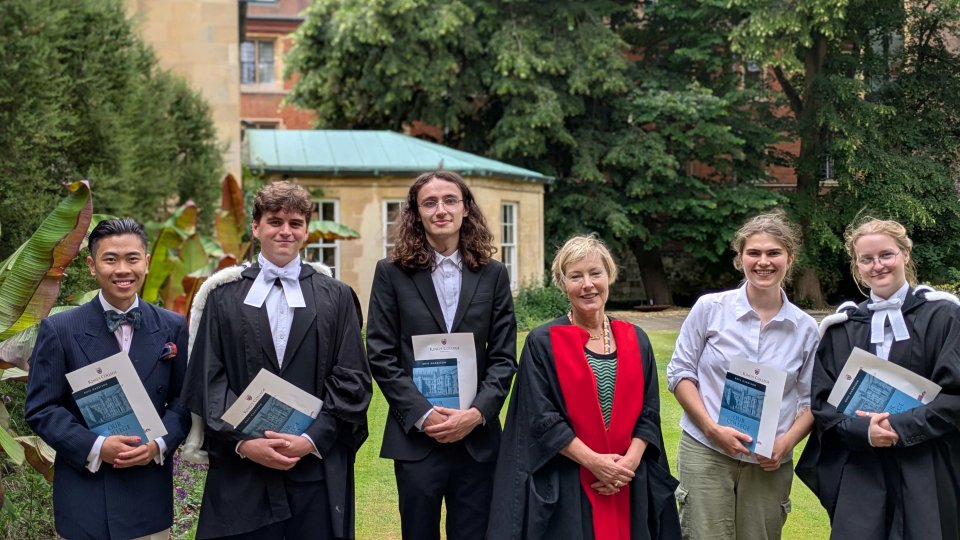The Architecture Department offers two courses: Architecture and Design. Design combines architecture, engineering and materials science in one degree, giving you the opportunity to design solutions to environmental and societal challenges. You will learn how small and large-scale designs such as physical objects, apps, artificial intelligence, electronics or architecture and planning systems can influence people, cultures, economies and the natural world.
The course is structured around a series of core studio projects which will require you to create solutions to real-world problems: from planning stage through to pitching a final product and evaluating user impact. For most projects, you will be working with stakeholders such as clients, end-users and suppliers. Outside of the studio, you will learn about related subjects including design history, philosophy, mathematics, engineering and natural sciences, which will then be applied to your design projects.
Based in the Department of Architecture, you will have access to a variety of facilities such as workshops, studios, reprographics, flexible co-working spaces and a new digital fabrication lab.
Course Structure
Most teaching will take place in the design studio. You are assessed on studio work at the end of each term through a combination of a portfolio, presentations and coursework. These will account for 60 per cent of your overall marks each year. Your design projects will be exhibited at the end of each year.
The rest of the curriculum will include lectures, seminars, workshops, and supervisions to build on the practical and professional skills which can be used in your design projects. These account for 40 per cent of your overall marks each year, and will be assessed through coursework. Please check the department website for updates on the course outline for 2024 entry.
Year 1 (Part IA)
You begin studio work with three design projects which introduce you to the core skills of design.
As well as studio work, you take five compulsory papers:
- Professional Skills I
- Materials and Fabrication I
- History and Theory of Design I
- Form and Forces I
- Mathematics and Programming I
Year 2 (Part IB)
You work on a further three projects in the studio. Briefs will be more open, require interdisciplinary engagement, and solutions will be analysed in diverse contexts of people and cultures.
As well as studio work, you take four compulsory papers:
- Professional Skills II
- Materials and Fabrication II
- History and Theory of Design II
- Form and Forces II
You also choose three further papers from a range of topics. Examples of options may include:
- Natural Materials and Structures
- Robotics, Automation and Advanced Fabrication Techniques
- Advanced Building Physics
- Internet of Things and Artificial Intelligence
- Design and Policy
- Advanced Studies in History and Theory of Architecture
- Bioinspired Design and Biomimicry
- Introduction to Data Science
Year 3 (Part IIA)
Studio projects take on greater complexity as the designs projects grow in scale. In these projects you begin to learn how to test, communicate and evaluate solutions integrating knowledge and skills from previous years.
As well as studio work, you take one compulsory paper:
- Professional Skills III
You also choose five further papers from a range of topics including those listed in Year 2.
Year 4 (Part IIB)
You work in the studio on a full-year design project with industrial partners. You also complete a dissertation project of your choice. This major independent undertaking is an opportunity to demonstrate creativity and mastery in design and at least one of the fundamental disciplines, using theoretical, experimental and/or computational methods. Both studio and dissertation projects make use of the knowledge and skills developed in Parts I and IIA.
You also take one compulsory paper:
- Professional Skills IV
Applying for Design at King's
We welcome applications from suitably qualified students at any kind of school, all over the world.
Subject Requirements
To apply to study Design at King’s you need to have an enthusiasm for design and, ideally, an interest in both the arts and the sciences. A level maths (or equivalent) is required to apply for this subject. Physics and an essay based subject can also be helpful preparation.
Written Assessments
Although there are no pre-registration required assessments for Design at King's, if you are invited for interview you will be asked to take a Cambridge college-registered Admissions Assessment which lasts one hour. You do not need to register for this assessment as it will be organised automatically by the College if you are invited for interview. Your performance in the admissions assessment will not be considered in isolation, but will be taken into account alongside the other elements of your application.
The assessment is the same as that of the Architecture Tripos, and is split into two sections: writing skills and graphic and spatial ability.
Portfolio
Applicants for Design are required to submit a portfolio (pdf, 6 x A4 pages) of work to their interviews once the UCAS deadline has passed which should be reflective of the portfolio you are able to discuss at your interview. We do not formally ‘mark’ or assess the portfolio but in judging your suitability for the course we will be interested to see the terms in which you discuss your work. The choice of material included in your portfolio is up to you; successful candidates have brought paintings, drawings, prints, photographs and constructions of all kinds, particularly material that conveys a spatial and three dimensional interest. We would not, however, expect to see designs for buildings – that is what you are coming to Cambridge to learn!


